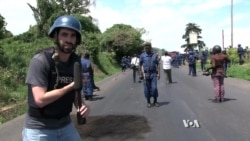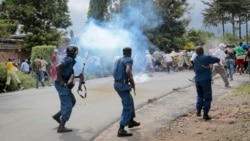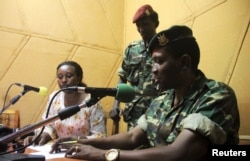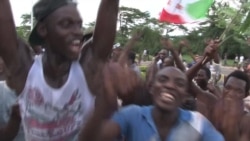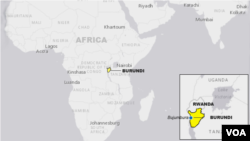A top Burundian official is dismissing claims of a coup by a renegade general.
Interior Minister Edourd Nduwimana told VOA's Central African service that forces loyal to President Pierre Nkurunziza remained in control of the presidential palace, state radio and television, and the main airport in the capital, Bujumbura.
He said the president was back in Burundi after traveling to Tanzania for a regional summit Wednesday, though he did not specify Nkurunziza's location.
In Washington, the White House called for an immediate end to the violence and for all sides to lay down their arms. Spokesman Josh Earnest also voiced support for the ongoing efforts of regional leaders to restore peace and unity in the country.
The State Department said U.S. diplomatic staffers spoke with key advisers to the president earlier Wednesday. But a spokesman said those contacts might have occurred before the coup claims were made.
Earlier, General Godefroid Niyombare told several private Burundian radio stations that the president had been dismissed and that he would form a temporary committee, which he would lead, to restore national harmony and unity.
“Given the necessity to preserve the country's integrity … President Pierre Nkurunziza is dismissed from his functions,” Niyombare read in a statement on Bonesha FM radio.
Niyombare made his declaration to reporters at a military barracks in Bujumbura and was surrounded by several other senior officers in the army and police, including a former defense minister, Reuters reported.
Tens of thousands of Burundians, including soldiers, took to the streets to celebrate the announcement. Airports and all borders were closed, according to a report from a private radio station.
WATCH: Burundians celebrate after coup announcement
The five-nation East African Community condemned the coup attempt.
The EAC, which includes leaders from Rwanda, Kenya, Tanzania and Uganda, is holding a summit in Dar es Salaam, Tanzania, to discuss the situation.
Linda Thomas-Greenfield, the top U.S. diplomat for Africa, is participating in meetings on the sidelines of the EAC summit in order to express U.S. concern about the situation in Burundi as well as U.S. support for the Arusha Agreement and political dialogue among all parties to ensure peaceful, credible and inclusive elections in Burundi, a U.S. State Department statement said.
Burundi has been rocked by protests since April 26, when Nkurunziza announced he would run for a third term. Clashes between police and protesters have killed at least 14 people and injured more than 200.
Critics said a third term would be unconstitutional, while the president and his supporters insist it would be legal because he was chosen by lawmakers, not a general election, for his first five-year term in 2005.
Factbox: Burundi
Burundi
Independence: July 1, 1962, from U.N. trusteeship under Belgian administration
Location: Central Africa; borders Democratic Republic of the Congo, Rwanda, Tanzania
Size: 27,830 square kilometers (17,292 square miles); worldwide, ranks 147th in size
Population: 10,395,931 (July 2014 est.)
Capital: Bujumbura; population, 707,000 (2014 est.)
President: Pierre Nkurunziza, took office August 26, 2005
Term limits: Burundi's existing political structures were founded on the 2000 Arusha agreement, which brought to an end the civil war between Hutu and Tutsi factions that had killed up to 300,000 people.
That agreement states the president can serve no more than two terms in office. But the 2005 constitution states the president must be elected through “universal direct suffrage” – interpreted to mean a popular vote. Nkurunziza was elected by parliament to his first term, so, his supporters argue, he is eligible to run again.
Protests: Protests began in April, after supporters of Nkurunziza urged him to run for a third term; elections are scheduled for June 26. The demonstrations have turned violent, with the government reporting at least 14 deaths as of May 12.
Source: CIA World Factbook
Burundi's constitutional court has ruled in the president's favor.
The officer at the head of Wednesday's coup attempt, Niyombare, is a respected figure who was fired from his position as Burundi's intelligence chief in February. Earlier in his career, he also served as Burundi's ambassador to Kenya.
Belgian law professor Filip Reyntjens, an expert on Africa's Great Lakes region, told VOA that Niyombare, in his role as security chief, warned the president in a lengthy memorandum earlier this year not to seek a third term.
The chair of the African Union condemned the coup attempt in Bujumbura and called for the return of constitutional order. Nkosazana Dlamini Zuma also warned that further violence would most likely lead to "further loss of lives, population displacement and destruction of property."
France has requested that the U.N. Security Council hold emergency talks on Burundi. VOA's Margaret Besheer said those talks were not likely until later Wednesday or Thursday morning.
Aru Pande contributed to this report from the White House. Some material for this report came from AP, Reuters and AFP.




